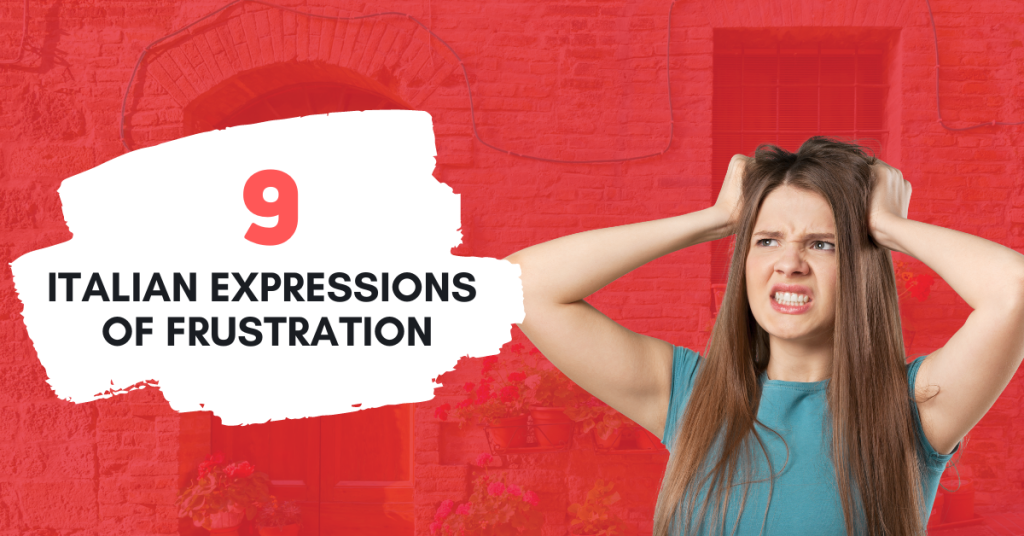Come ti senti? Frustrato! Italian expressions of frustration are common. If you want to express that you’re frustrated in Italian, you’ll find a lot of opportunities. However, I did leave out phrases that are filled with swear words, or le parolacce.
Let’s look at some of the top Italian expressions of frustration.
9 Italian Expressions Of Frustration
1. Non sono affari tuoi
What Does “Non sono affari tuoi” Mean?
The expression “Non sono affari tuoi” means “It’s none of your business”.
You’ll use this phrase just as you would in English. The tweet below is a great example of this phrase used by native speakers:
non sono affari tuoi.
— 𝖝𝖔𝖑𝖆𝖆𝖓𝖎 (@seranvrm) March 22, 2023
2. Come ti pare
What Does “Come ti pare” Mean?
The expression “Come ti pare” means “as you please” or whatever!
Per esempio: “vestiti come ti pare!” = Dress how you want/as you please. Or, if you’re mad at someone, you can simply say “come ti pare,” or “as you please/whatever!”
What is the Literal Translation?
The literal translation for this phrase would be: come = how + ti = you + pare = believe or think.
3. Smettila
What Does “Smettila” Mean?
The expression “smettila” means “stop it!”
You will use this expression in the same way that you would in English. For example, if someone is annoying you, simply say smettila.
What is the Literal Translation?
Smettere = stop + la = it and when you add them together, you get “smettila.” Make note that an “i” is added between these two words.
4. Non mi stai ascoltando
What Does “Non mi stai ascoltando” Mean?
The expression “Non mi stai ascoltando” means “you’re not listening to me.”
Per esempio: Perche non mi stai ascoltando! = Why are you not listening to me?
What is the Literal Translation?
This phrase is easy to piece together once you start learning Italian. Non mi stai = to me you’re not + ascoltando = listening.
5. Chi ti credi di essere?
What Does “Chi ti credi di essere?” Mean?
The expression “Chi ti credi di essere?” means “who do you think you are?”
Per esempio: Ma chi ti credi di essere per dire ad una persona quello che dovrebbe fare? = But who do you think you are to tell a person what they should do?
What is the Literal Translation?
The literal translation for this phrase is Chi = who + ti credi = you think + di essere = you are?
6. Non chiedo la luna
What Does “Non chiedo la luna” Mean?
The expression “Non chiedo la luna” means “I’m not asking for the moon.”
What is the Literal Translation?
What a fun Italian expression to say when you’re frustrated. If you’ve ever had to deal with a rental company in Italy and ask for a car with automatic transmission, you’ll find yourself saying this phrase when you find out that 99% of the vehicles are manual.
Breaking down this phase is simply: non chiedo = I don’t ask + la luna = the moon.
Note: You may feel the urge to put “per” in the phrase above, but do not add it because it doesn’t work like in English.
7. Ne ho fin sopra i capelli
What Does “Ne ho fin sopra i capelli” Mean?
The expression “Ne ho fin sopra i capelli” means “I’ve had it up to here.”
Per esempio: Di drama ne ho fin sopra i capelli! = I’m sick of the drama!
What is the Literal Translation?
If you were to translate this fun phrase literally, it would mean: “I have it up to my hair.”
8. Dai! / Ma Dai!
What Does “Dai! / Ma Dai!” Mean?
The expression “Dai!/Ma Dai!” means “come on!” or hurry up. When you say “dai” or “ma dai,” it shows that you’re annoyed or impatient.
Per esempio: Ma dai! Smettila. = Come on! Stop it.
What is the Literal Translation?
Dai has a few meanings, such as “da + i”, which means “from the or since,” but in the case of showing frustration, dai is used as an interjection and means “come on or hurry up.” If you use “ma dai,” it is “but come on!”
Note: If you have Netflix and access to the show “Baby!,” you’ll find that they say dai a lot.
9. Ma, che sei grullo?
What Does “Ma, che sei grullo?” Mean?
The expression “Ma, che sei grullo?” means: “Are you kidding? Are you crazy?.”
Per esempio: Ma che sei grullo amico mio? = Are you kidding, my friend? Or: “What are you stupid, my friend?”
What is the Literal Translation?
The literal translation of this phrase is “But, you are stupid?” or “But, that you are stupid?”
Expression Background
This expression is used a lot in Florence, but you may find that Italians in other regions do not understand you when you use this phrase. You also want to avoid using this expression with people you do not know, as it’s certainly possible that you’ll offend someone.
Italian expressions of frustration allow you to express yourself like a true native. Over time, we’ll cover and share more of these fun sayings with you. But for now, Ciao!

